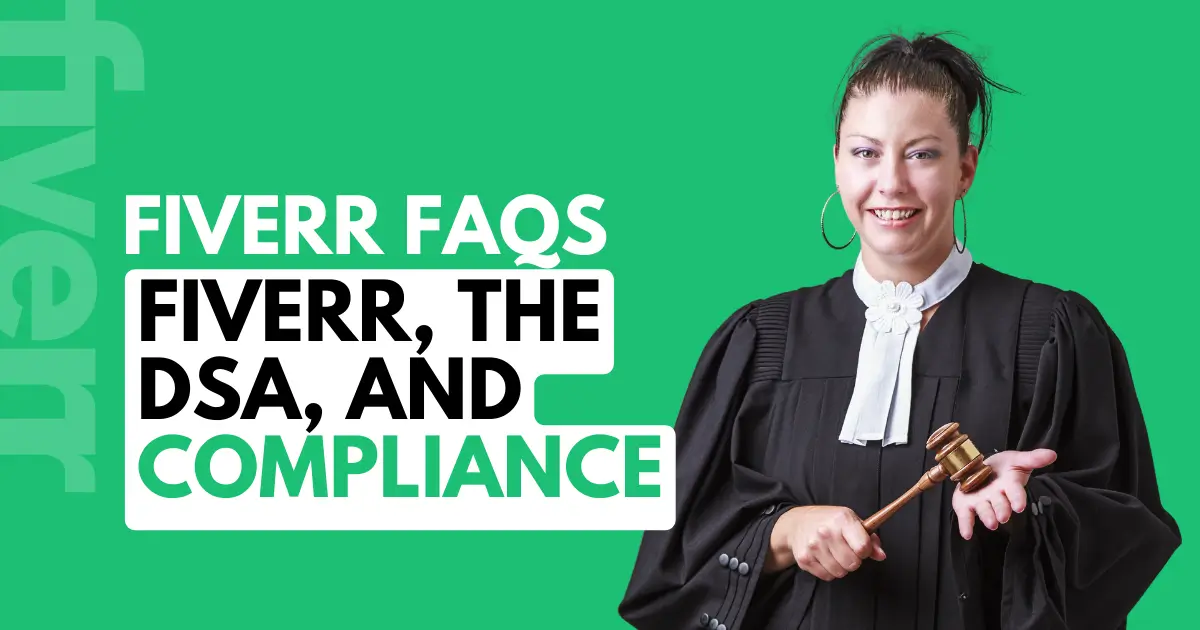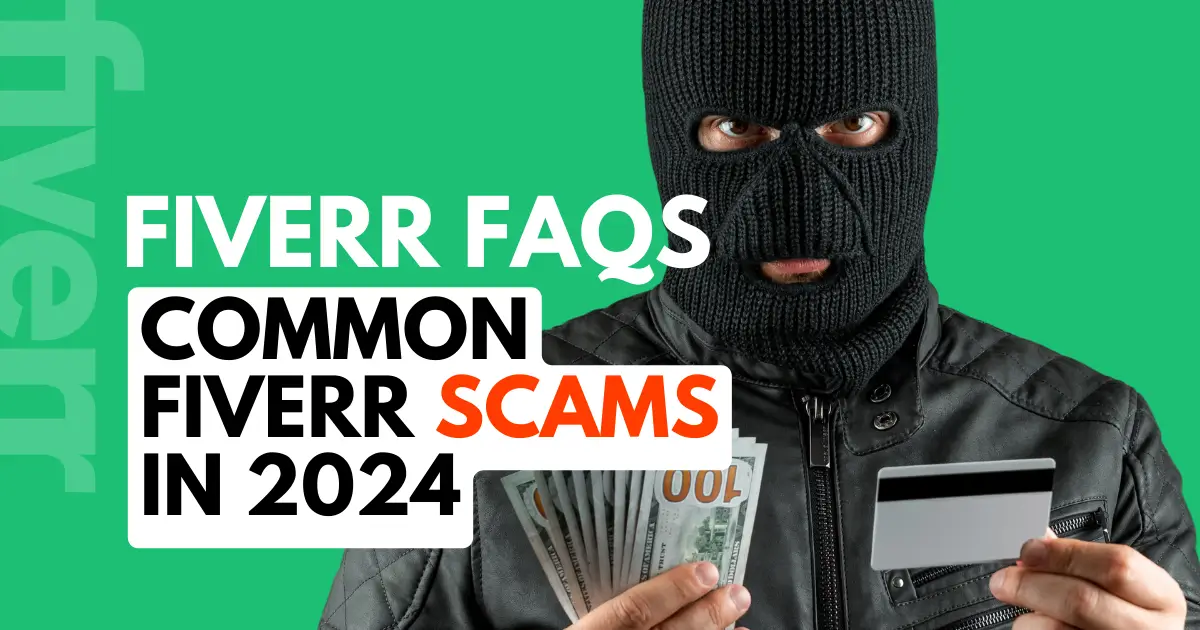
What is the Digital Services Act, and how does it impact Fiverr? More importantly, how does it affect you and your rights? The DSA is mostly good news for Fiverr users, with its transparency demands forcing a better platform. However, this transparency will not be welcomed by some sellers.
Whether you’re a buyer or seller on Fiverr, the Digital Services Act impacts you, even if you are not a resident of the EU. From a more stringent sign-up process to enhanced data privacy for users of the platform the name of transparency, big changes have happened and are coming to the platform.
If you’re interested in learning more about the Digital Services Act specifically as it relates to Fiverr, you’re in the right place.
Before we begin, I’d like to make it clear that I am not a legal professional and that this article should not be considered legal advice. This is an opinion piece based on my layman’s reading of the Digital Services Act and my extensive knowledge of how the Fiverr platform operates today and in the past.
I’ve been selling on Fiverr since 2013 and am a Top-Rated, Pro-Verified Seller who welcomes this new legislation and the transparency that has been forced on the freelance platform. This isn’t a comprehensive look at how the DSA operates. If you’re looking for that, please find more specialized articles. You won’t find anything about VLOPs (Very Large Online Platforms) and VLOSEs (Very Large Online Search Engine) in here – Fiverr is not considered one under DSA regulation, since it doesn’t have at least 45 million users in the EU.
What is the Digital Services Act (DSA)?

The Digital Services Act – or DSA – is a landmark regulation by the European Union (EU) that aims to create a safer and more transparent digital environment. It focuses on three core areas:
- Enhancing the accountability of online platforms like Fiverr
- Empowering the users of online platforms
- Protecting users’ fundamental rights online
Any business that wants to offer its services in the EU has to comply with the DSA. This means that Fiverr and its sellers both need to comply. Fiverr is responsible for ensuring that sellers are compliant.
Sellers who are not able to pass Fiverr’s freelancer approval processes cannot sell on Fiverr. The good news for sellers is that Fiverr removes the headache of offering services in the EU by taking on the burden of compliance.
Fiverr also has its own compliance rulings to meet. These are many and varied, and we’ll be covering some of the major ones in this article, especially those which impact user experience of the Fiverr platform as I see it.
The DSA is available here in many European languages. It’s over 100 pages long, very dense, and not all of it is applicable to Fiverr, which is considered as an online platform in the terms of the regulation. I have read the full Digital Services Act (it wasn’t fun). In this article, I’m going to explain exactly what the DSA means for you as a buyer or a seller on Fiverr.
How Does Fiverr’s Comply with the Digital Services Act?
The DSA came into force for platforms like Fiverr on February 17, 2024, shortly after the unpopular new levels and rating system came into place. At the time, Fiverr introduced these changes as a way to improve transparency without mentioning its regulatory necessity.
Many users were very confused by this, as the system that was presented to them was byzantine, confusing, and didn’t really feel transparent. Fiverr staff answering user questions also made the situation somewhat worse by giving confused answers; it seemed like nobody really knew what was what, other than this system was more transparent.
Around the same time, Fiverr also established a dedicated task force to manage the platform’s compliance issues. This team has two main jobs: to to identify areas that need to be adapted to comply and to ensure compliance across the marketplace.
Fiverr’s Success Score is the Child of DSA
While Fiverr doesn’t explicitly tell people the success score was introduced to comply with the DSA, its timing and Fiverr’s focus on transparency suggest that this was forced on Fiverr. In many respects, the success score is just the old “hidden metrics” now in the light.
What does this mean? The success score isn’t a “new” feature. It’s just an old algorithmic system that Fiverr was forced to expose in order to keep trading in the European Union.
Why do I think this?
The DSA requires all online platforms to be transparent about the parameters used in their recommender systems and ranking algorithms. In plain English, Fiverr must tell sellers about the factors it uses to rank them in the search listings. If that sounds familiar, it’s because that’s exactly what the success score tries to do!
The Success Score was introduced just days before the DSA was enforced. Many sellers don’t believe this score is anywhere near transparent enough, but before this, everything important was under the secretive veil of private reviews and hidden metrics.
This is an improvement, even if sellers are left scratching their head about how it works. Many sellers don’t believe that this score is fully transparent, since it obfuscates Fiverr success scores by comparing individual performance with other sellers. In other words, your score isn’t really “your” score. It’s just a marker of how you compare against your competitors. This makes perfect sense for a search and sort algorithm – much less so for individual performance guides.
I have already written about how sellers could use specific checkboxes that buyers check in reviews, together with Help Center documentation to better understand their success score. The somewhat spread-out and semi-hidden nature of this information isn’t as transparent as it could be, but it is more information than sellers have ever had access to before.
Either way, it was not received well by the selling community and led to two Fiverr millionaires, Levi Newman and Alex Fasulo choosing to quite the platform in its wake.
Fiverr Has Changed A Lot of Its Back Office to Comply
Fiverr has made some big changes to its platform in the past year, presenting them to users as efforts to go upmarket and enhance the user experience.
- Enhanced user identity verification
- Increasing transparency
- Strengthening reporting tools
Let’s go through them, one-by-one:
Fiverr Has Cracked Down on User Verification
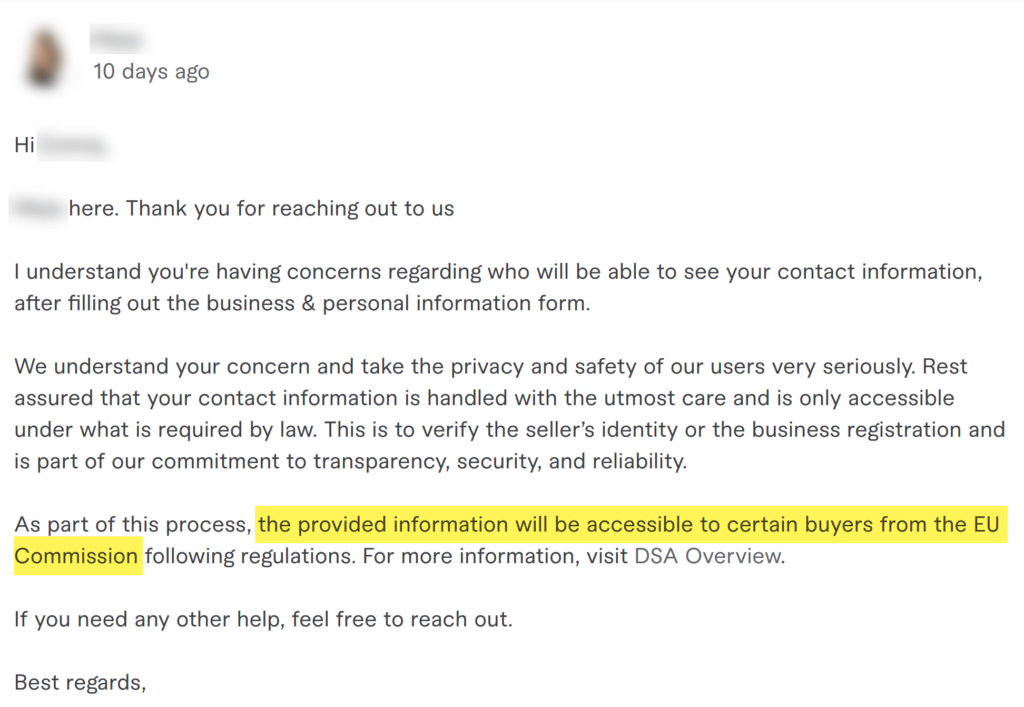
The Digital Services act requires online platforms like Fiverr to verify that service providers are who they say they are. This is reflected in a much more complex seller account activation and approval processes than before.
Fiverr has millions of sellers, so the process of verifying older users who registered before DSA is not complete. The platform is asking sellers to verify their identity and business details over the course of 2024. This is scheduled to finish by February 2025. So, don’t be too surprised if you get an email in the next few months asking you to (re)verify! If you were invited to the Professions catalog, then you will have noticed that even if you have already verified, you were asked to verify your identity again.
In future, what Fiverr describes as “certain EU customers” will be able to see the details of sellers. The details that will be shared are:
- Name
- Address
- Phone
- Business registration number (where applicable)
- Self-certification of compliance with Fiverr and EU policies
Right now, these details are all anonymous (with the exception of name, which sellers can choose to share in their display name). When I reached out to Fiverr’s Customer Support to find out who “certain EU customers” are, they told me that this information was open to “buyers from the EU Commission” (see image, and “private buyers”:
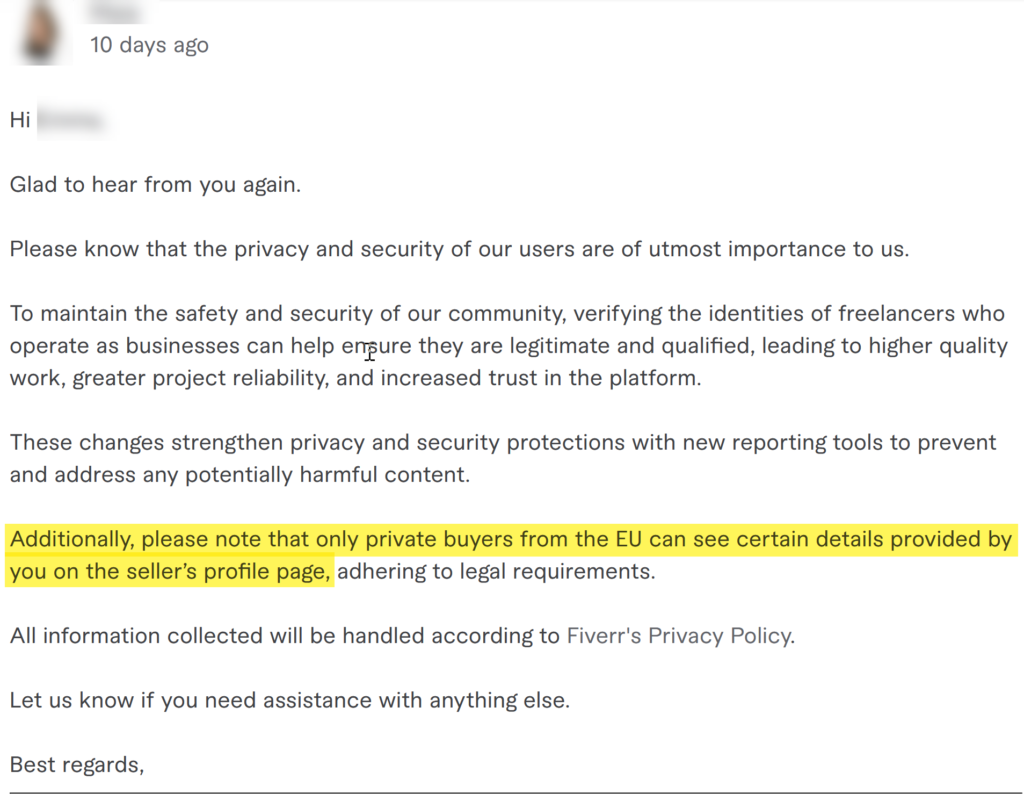
What does this mean? It’s hard to tell. When I followed up asking for more clarity on what Fiverr classified as private buyers, the conversation was shut down:
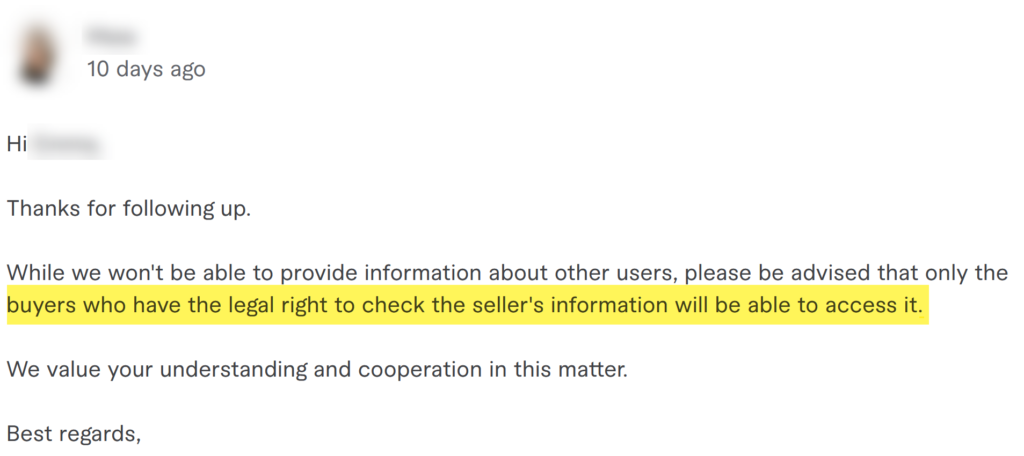
Further attempts to get more information and requesting that the DSA Taskforce discuss this legislation on the forum as part of a Q&A resulted in me being indefinitely banned from the forum:
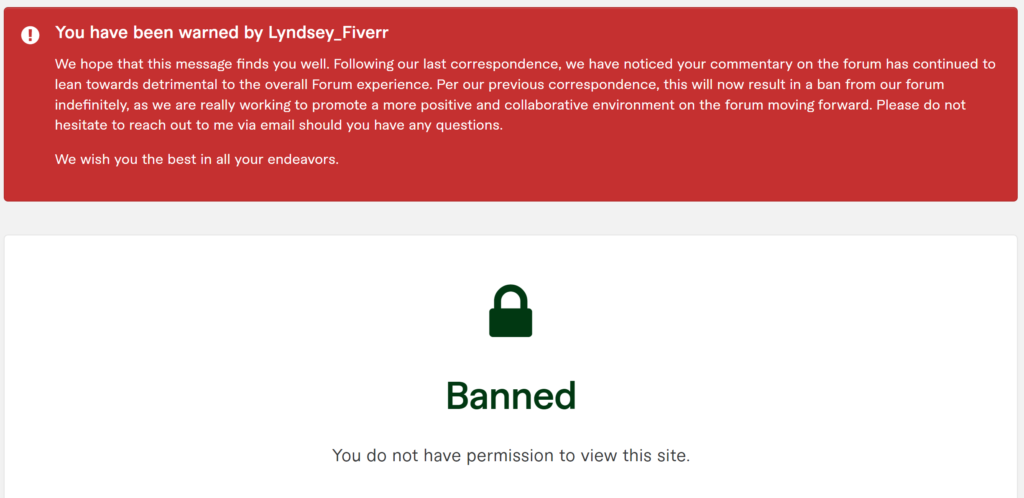
Fiverr Is Improving Its Transparency
“Transparency” has been a hotly-debated word on Fiverr in 2024, with many sellers questioning the company’s commitment to transparency. Despite this, it is inarguable that the company has taken steps to increase its transparency to meet the guidelines of the Digital Services Act, at least when forced to by regulators and lawmakers.
Content Moderation Practices
Fiverr’s marketplace has a poor reputation; many people view it as a place full of low-quality gigs. For the past year, Fiverr has been trying to clean this up. In Q3 2023, it announced that it was going upmarket with a whole blitz of changes. In retrospect, this feels more like the platform starting to meet its DSA compliance requirements ahead of February 2024.
Fiverr now has a much stronger focus on sellers giving customers a better experience, primarily enforced by the success score and other metric systems that feed into the rankings algorithm. Outside of this, a content moderation team checks content posted to the website to ensure that it meets a minimum standard of quality.
Plagiarism, fraud, and other negative acts are now strongly prohibited. Fiverr’s Community Standards outlines the details of this policy. Since Fiverr is a vast, global platform, it partially relies on users reporting content, although false reports and report spamming (for example, to damage a competitor) will result in an action against the reporter rather than the reported.
Advertising Policies
The DSA forbids Fiverr from advertising to minors using profiling data – in other words, they can’t advertise to users under 18. Users can now also opt-out of Fiverr’s direct marketing. Fiverr’s privacy policy has detailed information on how the platform uses its collected data to advertise.
If you don’t like Fiverr’s direct marketing emails – or any of its direct marketing, then I recommend reading its privacy policy and sending an email to the provided opt-out address. Even if you are not living in the EU, many other countries, such as the United States, also have opt-out laws for this kind of advertising.
Data Sharing
Fiverr takes its users privacy seriously. One notable change since DSA was implemented is that Fiverr requires businesses to verify their details before they can share on Fiverr.
Fiverr’s privacy policy also outlines how the collect and use data, internally and with third parties. Fiverr already had a good track record in this area thanks to GDPR, the EU’s privacy law. The main change that the DSA brings to the table is a bigger focus on openness, particularly in sharing limited seller details with private buyers as required by the DSA’s transparency requirements.
Fiverr says that only certain buyers from the EU Commission and private buyers are privy to these details. However, the company was reluctant to expand on what this means. It may have the right to do so, but it’s a black mark against the transparency that the company claims for itself outside of legal and regulatory enforcement.
Strengthening Reporting Tools and Dealing with Abuse
This part of Fiverr has not changed enormously; long-term users of Fiverr will be familiar with Fiverr’s reporting processes. The biggest change is a largely invisible one. Fiverr has improved its response times to reports of illegal actions and abuse. Now the company responses faster and takes appropriate action when an issue is reported.
If something illegal is reported, the DSA mandates swift action. For things that violate Fiverr’s Terms of Service only, Fiverr has more freedom to act as it sees fit. If Fiverr is unable to resolve the report to a user’s satisfaction, they can take their complaint to the DSC and an out-of-court settlement dispute. More details about that further down this article.
Is the DSA Good for the Fiverr Community?
Overall, I think the Digital Services Act is a net positive for freelancers and clients on Fiverr. Some sellers will not be happy with the transparency rules that mean Fiverr has to provide details such as their name and email address, but this is unavoidable if they want to sell. The days of anonymous online selling are becoming a thing of the past, not just on Fiverr.
I view this as positive because the DSA forces a more trustworthy online environment for users. The KYBC (Know Your Business Customer) principle of the DSA means that Fiverr and its buyers will know exactly who they are dealing with, while the improved reporting tools mean swifter action can be taken against bad actors.
The only issue is that anyone can sign up for a Fiverr account to purchase services without needing to provide their details. 2024 has been one of Fiverr’s worst years for spam. Over halfway through 2024, the company has still not been able to successfully tackle this issue.
The Digital Services Act Increases Protection for Minors
Minors (people under 18) on Fiverr also benefit from the DSA, protecting them from harmful content and exploitative business practices. Many of these policies were already in place, but the DSA has strengthened the need to act on them:
- Children under 13 cannot use Fiverr
- Teenagers aged 13 – 18 can use Fiverr with a parent or legal guardian’s consent
- If the minor is the primary service provider, this must be clear in gig descriptions
- If a service involves a minor (e.g. photography for kid’s products), this must be clear in the gig description
- Minors are prohibited from being involved in sexually explicit or suggestive content
- Minors can also not be involved in violent or otherwise exploitative content
There is more detailed information available in Fiverr’s full minors policy.
Fiverr’s Users Have A Stronger Voice Against Fiverr

The DSA wants to take back a lot of power from large online companies like Google and Facebook, so many parts of the DSA deal with giving users more control of their experience. Fiverr isn’t held to the same standards as Google or Facebook, since it is a much smaller company. However, that doesn’t mean that Fiverr is off the hook.
Fiverr is now required to have a more rigorous structure to handle complaints about their content moderation decisions. This includes information on gigs being removed and disabled accounts. However, at the time of writing, I was unable to find any more information about these processes.
It is my hope that Fiverr is working on this.
Fiverr has a long history of sending out inadequate information to the users it bans, citing little more than “TOS violations”. While this has improved in the past year, I don’t believe it’s as transparent as it could be – sometimes, more information comes from the URL parameters of Fiverr’s emails than the actual email itself! Just hover your cursor over the link and read the URL, then read the complaint.
To give an example of how this could be improved, take a look at the DSA Transparency Database. Fiverr is not required to report to this database, but it could follow a similar framework to bolster its transparency and show users like me that their commitment to transparency is genuine, rather than just forced compliance and public lip service to the ideal of transparency. I’m not saying this database should be public, or even a database, but a user should be able to at least view the very specific reasoning behind their ban.
How to Report Fiverr for DSA Violations
The DSA has specific steps for users to take when they want to make a complaint about Fiverr. These are outlined in Article 20 and 21 of the DSA. To quickly go over it, there are two levels and you should take them in order, escalating to the second step only if the first doesn’t resolve the issue.
Filing a Complaint with Fiverr
This is the first step; simply complain to Fiverr, who will need to provide free, timely, and human steps towards resolution. The emphasis is on people, not AI, handling the complaint. If this step fails, then Fiverr users who are still unhappy can consider escalating.
Fiverr and DSA Out-of-Court Settlements
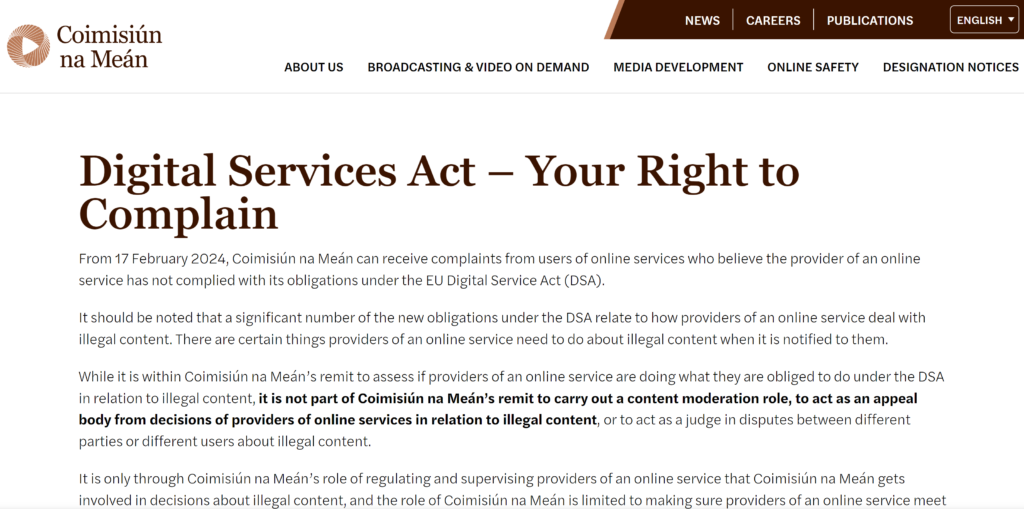
Each member state of the EU has a Digital Services Coordinator (DSC). This is an independent regulatory authority that handles compliance with DSA regulations.
If you are EU resident, you can find the contact details for your member state’s DSC and choose a DSC-certified extrajudicial settlement body (a kind of court). It is not clear what to do if you are not EU resident, although it appears that you can still appeal anyway – if you find yourself in this situation, I would advise seeking professional legal advice.
Fiverr and the user will have in a meeting to find a resolution. In case of dispute settlement, Fiverr would pay the cost if the user wins the dispute. If the user loses, then they are responsible for costs. While this might be a low-cost course of action, it should only be considered if the user has a good case.
The DSA Is Complicated – And the EU Has More to Come
The Digital Services Act is a powerful regulation that has a global reach. For better or worse, if a company wants to sell in Europe, it must abide by the regulations set out by the European Union. Fiverr has made a strong commitment to upholding the basic values of the DSA, although personally, I feel that they could go further. However, like many companies, meeting the minimum is as much as users can expect.
Reading through the DSA, it became obvious to me that Fiverr’s Success Score was not implemented because it would help users; it was simply the benefit of the Digital Services Act insisting on this information being provided. Will Fiverr make it more useful? This is unlikely, since the freelance platform has probably carefully worked out exactly how much information it is required to divulge (without locking it behind the Seller Plus paywall!)
Fiverr is complaint with GDPR and DSA, but the EU is not finished yet; the EU AI Act will be coming into force in the near future. The AI Act is set to be a world-first that will set the gold standard for regulatory frameworks around the use of AI. It will be interesting to see how the EU forces Fiverr to further change its business model, especially when you consider the company’s somewhat dubious embrace of AI.
The biggest question mark for me is what Fiverr classifies as “private buyers”. Unfortunately, neither the EU nor Fiverr define who these are.
(PS – remember, I am not a legal expert and all the above is based on my layman’s reading of very complicated legal texts! If you need legal advice, please consult a professional who specializes in EU law)

